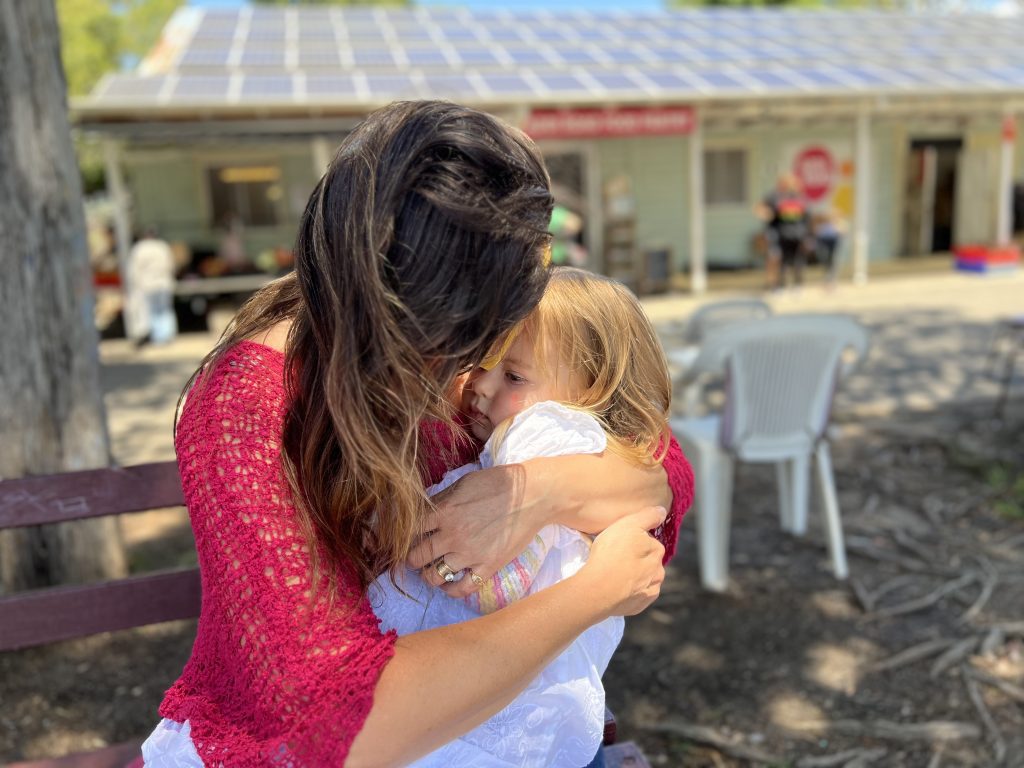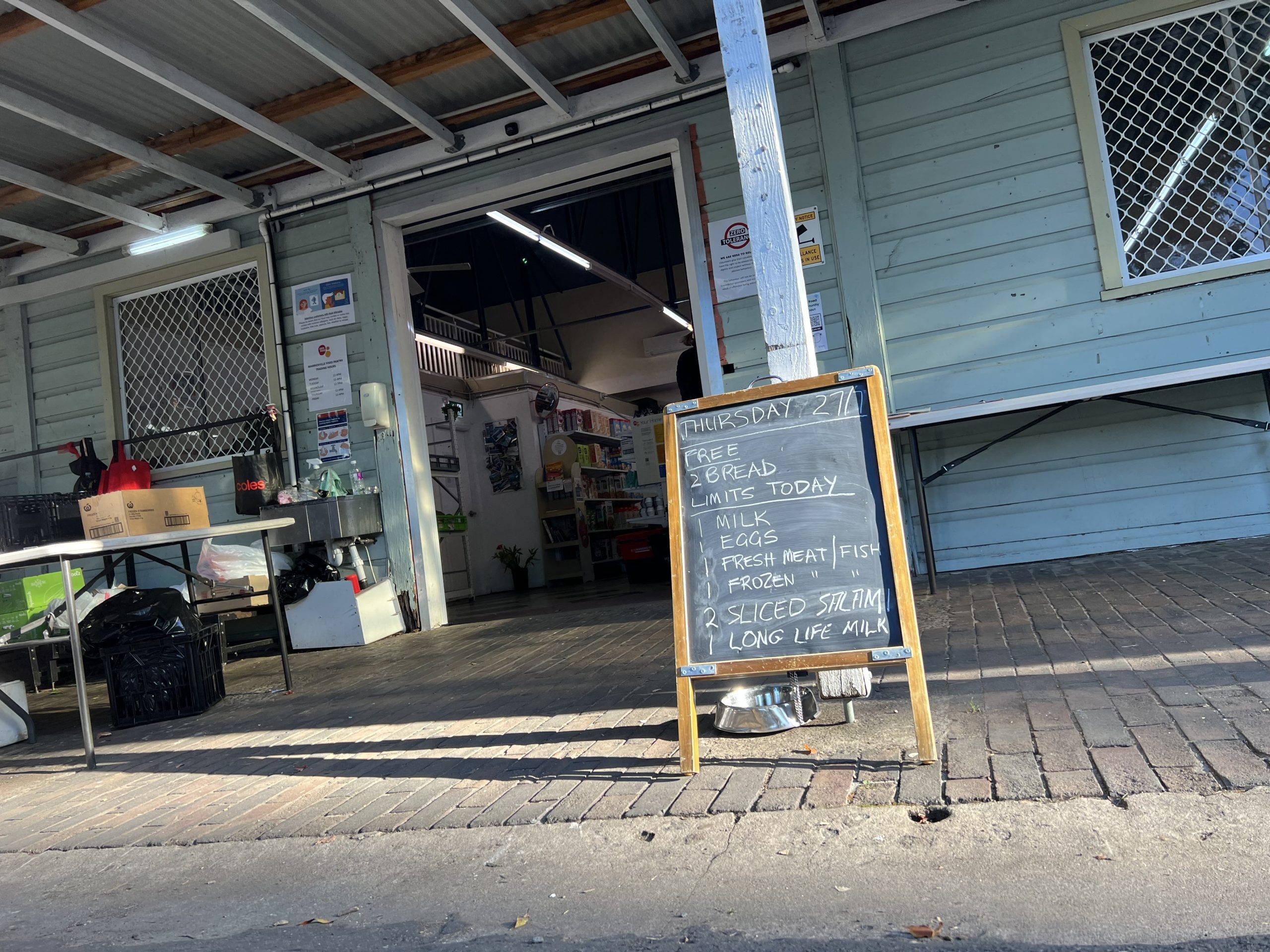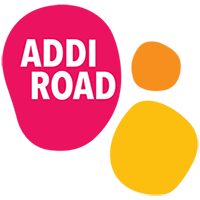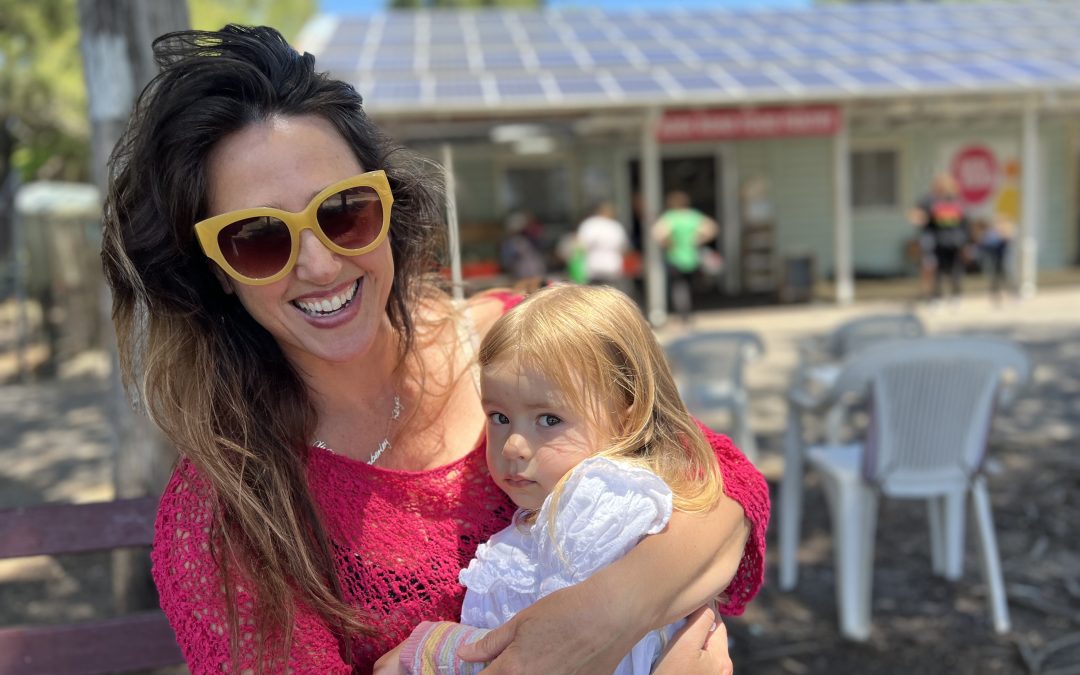Are they the world’s largest sunglasses?
Kim laughs at the question. “Yeah, I know. They’re very ‘90s. Should I keep them on?”
Her daughter is due for a sleep soon too, so she doesn’t have loads of time to talk. But if a picture and a bit of a chat somehow means Addi Road will be able to further promote the Food Pantry then yeah, sure, Kim says she is happy to be one of our ‘star customers’ for a social media profile.
Having graduated from NIDA some years back, she’s in the process of changing her vocation, studying psychotherapy full-time at university. She’s also a full-time mum. “Which means while I study that we’ve become a one-income family.”
Trying to maintain a family on just her husband’s income in Sydney can “bring lot of stress, especially with so much else going on in the world”. She leans over and kisses her daughter, their only child at the moment. “We might have another in the future,” she says, forming the thought as a playful question for her little one who stares back at her. “We will have to wait and see,” Kim says, amused, squeezing her daughter a little tighter.
Sitting outside on a bench beneath a much-loved and shady tree, Kim’s studies and life as a young mother are just a few of the reasons as to why “this place here is so important”.

Kim gives her daughter a hug outside Addi Road Food Pantry Marrickville. Photo Mark Mordue.
Kim wishes she had known about Addi Road Food Pantry a long time ago. Despite being a local who grew up in the area, she only discovered the place about a year ago. “A lot of people still don’t realise it’s here, you know. I am always telling friends about it. We affectionately call it ‘the Co Op’ even though I know it’s not a co-up, don’t we,” Kim says, talking directly to her daughter again.
“When I told my husband about the Food Pantry and how it works he said, ‘That is so awesome.’ He was stoked. He said, ‘You need to shop there every week.’ I told him when I can!”
She laughs again. On a fresh, sunny, blowy day there’s a relaxed, almost picnic vibe outside as customers sit and wait to enter while others come and go around us. When things get a bit crowded like this during the opening rush-hour the place works on a simple numbers system. People sit around and talk to one another or take a moment to quietly catch up on life for themselves while they wait to be called.
It makes it an easy place for Kim to manage shopping with a young daughter in tow.
“It’s such a kind thing to do for people, running a place like this,” Kim says. “I like what you have written on your van, the slogan: ‘the right to good food is a human right’. It’s so powerful. I love it.”
We talk about friends, fellow actors, musicians, writers, academics, many of them struggling to keep a roof over their heads and put food on the table for themselves or their families. Kim is momentarily rueful. “This country has no respect for its artists.” But she thinks things are just getting tougher for everyone as inequality grows and Sydney becomes so difficult to live in.
“Being able to come here, this kind of thing that you do, it softens the blows and makes living in Sydney a bit more manageable. Especially if you have children. I just bought nappies, baby wipes and baby tooth paste at the Food Pantry. Normally that would have cost me $30 at a major supermarket. Here it was only like $10 and then I got to choose from the free bread and fruit and vegetables that are thrown in once you spend over $5. It’s so great what’s possible depending on what you have in stock.
“It’s just beautiful for us to support the place as well,” Kim says emphatically.
“I believe in the sustainability message you have of rescuing food and stopping it going into landfill and creating greenhouse gases. So I will support this place even when I am back earning a wage again. More power to you [Addi Road] for doing it. The way I see it, it’s all about more respect and giving back to people; and more respect for food and the planet too.”
Kim laughs at herself. “You should not have asked me to talk. I have a lot of opinions.”
She really better get going as her daughter is showing serious signs of wanting that sleep. But Kim does want to tie the conversation about the Addi Road Food Pantry together with where her own world is headed. Much as she loved being an actor and still does, she says she started to feel what she calls “a fatigue in my life” about having to always please others. “Hearing someone say jump and having to respond by asking how high. I guess I was wanting to take some power back in my life by doing the psychotherapy course.”
An initial interest was called ‘eco-psychology’ but she’s since found herself grateful and increasingly appreciative of the broad foundations of the course she is doing and the way so many different areas are continually being woven together. It’s taught her that the nature of helping yourself and helping others will change. “Human beings at any given time need different things. What we call ‘help’ has to change with that. What I am doing now comes out of my love of acting in the past. It’s basically related to my love of human stories. But it’s deeper. And I can actually have a more creative role. It excites me.”
Kim picks up her daughter and starts walking, holding her on her hip while she carries her shopping bag with her other hand. “With studying psychotherapy, I wanted to have some autonomy over my life, to find some self-respect and be involved in helping others.” Kim looks around. “That can be a very simple thing, though, like the story of this place here – and the autonomy and respect it allows people to develop just because they have enough food on their table.”

Addi Road Food Pantry

